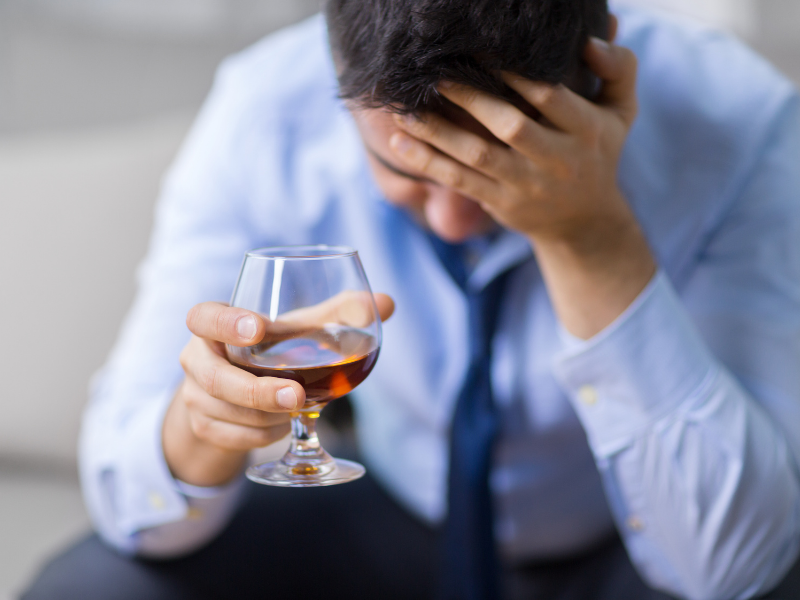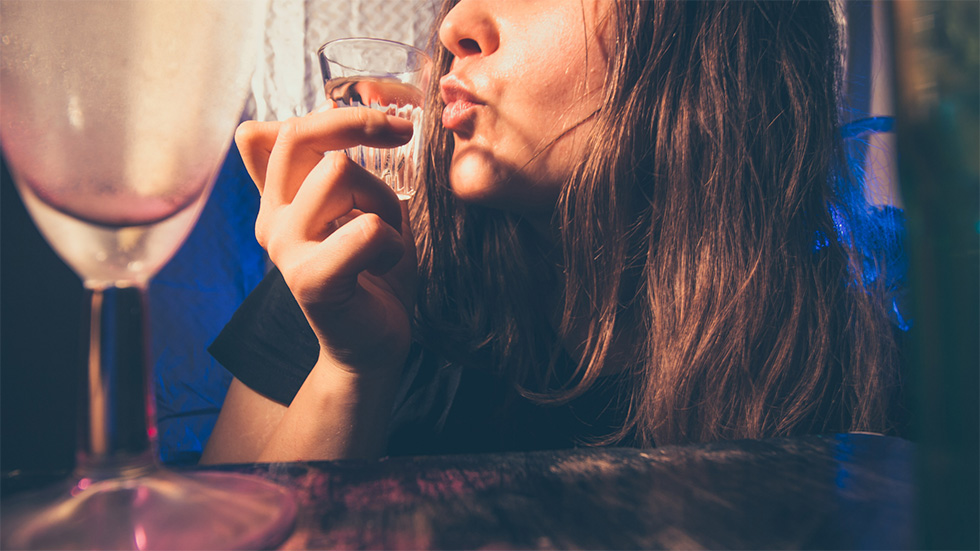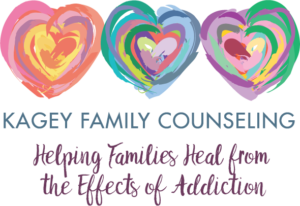When Drinking Stops Being Fun
If you’re a big drinker, you’ve been drinking a lot lately or if you’re pretty sure you’re an alcoholic, it might be hard for you to imagine coming to the point where you actually quit drinking. Or even want to quit. However, at some point, for all alcoholics who are in recovery from alcoholism, there came a moment when they experienced a shift in their perspective. When their drinking was no longer serving them. When the bad times outweighed the good times. When it took more and more and more to catch a buzz. When their lives were potentially in the balance. Or when they’d just had enough of never feeling they’d had enough.
Maybe you’ve been close to this point yourself before. Maybe you’ve tried quitting, but you’ve found yourself drinking again each time. Or maybe others have suggested you should stop drinking because they’re worried about you, and you’ve tried to stop, but you’ve realized that you’d rather keep drinking instead. Or perhaps you’ve quit for several months at a time, but you find yourself knocking ‘em back once that party or reason to celebrate rolls around again. Or maybe you really, really want to stop drinking, but you just can’t.
For those who have quit drinking, the moment at which they stumbled upon their “last drink” is something that stays with them. It’s not an experience they ever forget. Most can recount what changed for them and why.
What Led Her To Quit Drinking For Good
For those who used to drink a lot but have since quit, what changed for them? What happened that they finally came to the point where they knew they had to stop? What shifted such that they ‘decided’ to stop drinking for good?
We asked these questions to a few of our clients who are sober from alcohol and consider themselves to be recovering alcoholics. They told us what it was like for them when their last drink came and why they decided to get help and stop drinking for good. The following is one such woman’s story (her name has been changed) who granted us permission to share her story here with you.
In Her Own Words – Carrie M.
Carrie is a woman in her mid-50s who quit drinking twenty-one years ago. She’s been sober and active in recovery since her last drink and has never had a relapse. Carrie’s last drink came one night after she’d been drinking for most of that day. She recalled:
“For at least a month before my last drink, I started having blackouts – which I’d never experienced before. My friends would call me the morning after a night out, and they’d ask me if I was OK. Confused by their questions, I’d listen as they recounted the night’s events to me. My friends told me I’d yelled hysterically at a bartender and had been shouting in the streets as I walked along to the next bar with them. I was usually a fun, happy, and congenial drinker, so this was super embarrassing.”
Carrie said there were a few nights like this, but her worst recollection came after she woke up in her ex-husband’s bed after a night of heavy drinking. She remembered:
“Yeah, I woke up in my ex-husband’s bed, and I had no memory of what had happened. I remember drinking with him at his house all night, but I didn’t remember anything else (this was not a case of her being drugged or assaulted). I was so ashamed the next day. I couldn’t believe I’d done that. That was a real low for me.”
After a couple months of blackouts and regrettable incidents, Carrie said she really wanted to stop drinking. But she couldn’t seem to quit on her own. She’d tell herself she’d only have a few drinks each night, but then she’d have half a dozen beers and shots on top of that. She’d tell herself she wasn’t going to drink at all for the evening, but she’d wind up finishing a couple bottles of wine.
“The Alcohol Stopped Working For Me”

Emotionally
Alcohol stopped working for Carrie emotionally in the year before she finally quit drinking. Most of the time, the alcohol helped Carrie to feel numb and to just have fun. When she drank, she felt carefree and unencumbered by difficult feelings such as pain, fear, loneliness and worry. She was able to let go, laugh, dance and have a great time with her friends However, eventually this changed:
“For a long time when I drank, I had a ton of fun and all my fear and pain disappeared. But in that last year, not only was I not having much fun when I was drunk, but I started to feel more anxiety. When I was buzzed, I also started getting super emotional and would start crying out of nowhere. Instead of being the life of the party, I was having these over-emotional moments where I’d just be sobbing and sobbing. It was humiliating and certainly not fun! That’s when I started to think about stopping cause I didn’t want to keep having all these big feelings when I drank – I wanted to be numb and just enjoy myself.”
Physically
The alcohol also stopped working for Carrie physically – she stopped being able to obtain that buzz or high she had always enjoyed so much. The last day she drank, she was unable to get buzzed regardless of how much she drank. It happened like this:
One afternoon, after Carrie told herself she didn’t want to drink that day, she found herself downing four margaritas followed by shots – but she still felt completely sober.
“No matter how much I drank that day, I never felt drunk or even buzzed. I think I drank a dangerous amount of liquor that day, but I never ‘felt’ it. That shocked and scared the crap out of me, so I called my friend. After telling her what was going on, she invited her over and sent me a cab. I’d wanted to drive because I ‘felt fine’, but I waited for the cab, knowing I must’ve been legally over the limit at that point.”
The Moment To Quit Came (and She Got Help)
Once Carried arrived at her friend’s house, they sat together and talked. Carrie was scared by the fact that she had drank so much alcohol that day, and yet it had had no effect on her whatsoever. As she reviewed the cumulation of negative experiences she’d been having while drinking, Carrie decided it was time to quit drinking altogether. She describes that moment like this:
“While talking to my friend that day, I came to the point where I knew it was time for me to stop. I had literally lost all the benefits of drinking – the buzz, the fun, the emotional escape, the good times, and my ability to control when and how much I drank. I didn’t like the person I was becoming, but I hadn’t been able to stop on my own. When I went to my friend’s that day, it’s like it all just came together, and I knew it was time to stop.
I hadn’t gotten into any trouble, and I didn’t lose everything like some people do, but I knew those things weren’t far off if I continued to drink.
However, even though I knew I had to stop, I wasn’t sure how I was going to, since I’d been trying not to drink for a while by then. Miraculously, the friend whose house I went to that day was in AA, and she invited me to a meeting the next morning. Even more miraculously, I went.
When I sat in that meeting, I heard women share their experiences about their own drinking, and I related to everything they said. I related to the way felt, what they’d been through, and what led them to deciding to get sober. It all just clicked for me, so I kept going back, and I haven’t had a drink since. I know I’m very lucky, and it’s not always that simple for people, but that’s how it worked for me, and I’m extremely grateful.”
Can You Relate?
We’ve shared Carrie’s story with you here because sometimes it helps to hear what led someone else to quit if you’ve been struggling to quit yourself. Maybe her story sounds familiar to you. Perhaps you can relate to parts of what led her to quit drinking and not others. Or you might have experienced the exact same things she did. Either way, if you’ve been on the fence, sometimes hearing a real person’s story can help you decide to go in one direction or the other.

If you’re a man reading this – the specifics of Carrie’s story might be different than yours, but the themes of her story might land for you – drinking stopped being fun, you started doing things drunk that you regret, or you’re barely able to feel buzzed anymore.
Wherever you find yourself today – the only person who can decide if you’re ready to stop drinking is you. No one can force you, no matter how hard they try. Even if you’re in jail or somewhere else where it’s hard to access alcohol, you’ll still find a way to drink if you’re determined to do so.
Addiction/Alcoholism
If you’re addicted to alcohol (like Carrie was) and are an alcoholic – quitting on your own is almost impossible – no matter how many reasons you have to stop. Despite all of the conclusions Carrie came to that led her to stop drinking, if she hadn’t had the support of her friend and hadn’t started going to AA, she is clear today that she never could have quit drinking on her own. She had tried. And tried. But she always found herself drinking again. It wasn’t until she reached out to her friend and was willing to go to an AA meeting, that she had the support and help she needed to quit for good.
Getting Help – AA and 5 Other Programs
If drinking has stopped being fun for you and/or it’s started to cause a lot of damage in your life, it may be time to seek help. If you think you may be an alcoholic, and you’re willing to get help, there are many resources available to help you.
Obviously, the most well known resource is Alcoholics Anonymous (AA). While AA doesn’t work for everyone, it is an available first step to try. We’ve posted a recent blog about how to access Houston AA meetings during COVID, since many meetings have moved online. If you are outside the Houston area (anywhere else in the USA or around the globe), the AA website can provide you with support and lists of meetings for where you live.
If you don’t want to try AA or AA isn’t for you, you can try other programs such as: SMART Recovery, LifeRing Secular Recovery, Women for Sobriety (WFS), Secular Organizations for Sobriety (SOS), or Moderation Management (MM). We believe recovery is a journey with many paths to healing – there’s no one right path for everyone. Whether you go to AA, one of these other programs, or you find another source of support to help you get and stay sober, the most important thing is that you take that first step and ask for help.
We’re Here to Help
We are dedicated to helping you with all aspects of recovery from alcoholism and addiction. We offer a full range of services for those who are struggling with alcoholism and for the family members who love them. We also offer options for those who need or are looking for more structured care such as our Intensive Outpatient Program (IOP) or our Partial Hospitalization Program (PHP) (Most major insurance plans are accepted for our IOP and PHP).
We invited you to call us at 832-928-0211 with any questions you may have or for a free 15-minute consultation. This is a hard time for everyone, and if you’re contemplating quitting drinking – it may feel even harder. You’re not alone. We’re here for you.
Share this Story and Engage with us on Social!


